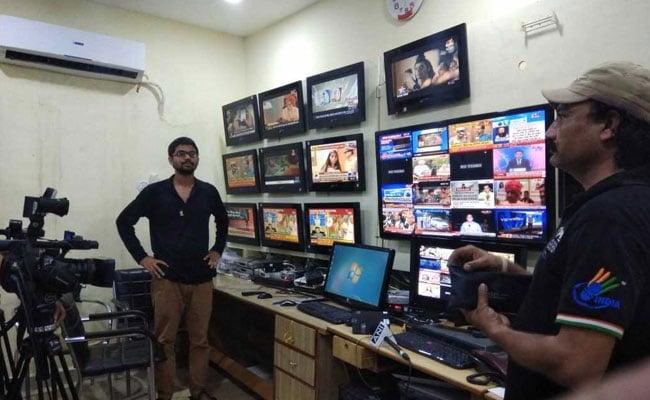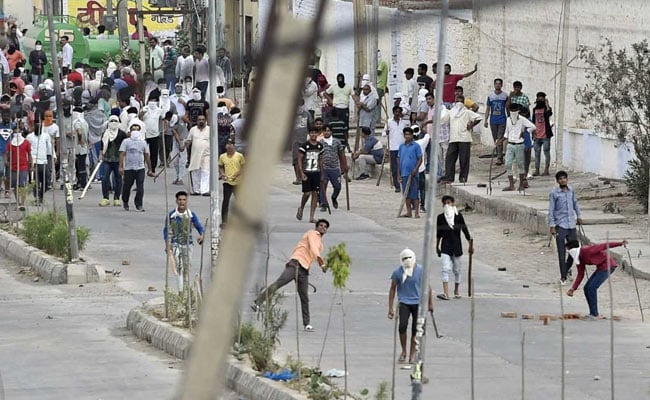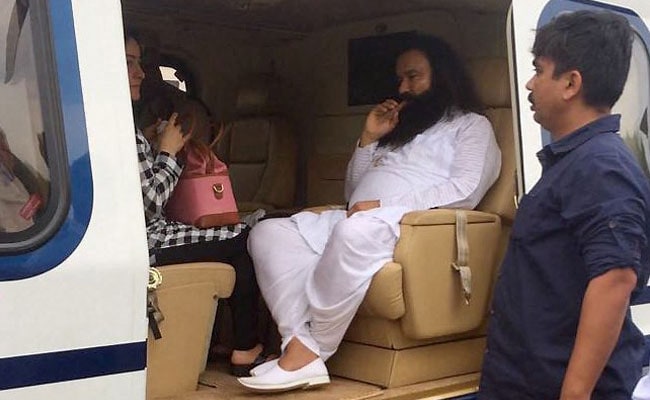"This will be the year's biggest story," a journalist friend in Delhi responded when I said I was heading to Sirsa in Haryana to report on the verdict of Dera Sacha Sauda chief Gurmeet Ram Rahim Singh.
My plan was to arrive in Sirsa before the verdict and to then cover the aftermath. I went to Sirsa on Thursday with Ashwani Mehra, my cameraman, and fellow reporter Saurabh Shukla. The entry point to the town had been sealed but that didn't prevent hordes of followers from marching towards the Dera headquarters.
Devotees holding wooden sticks line the roads in and near Sirsa
The extraordinary narcissism of their "God" was on full display with massive banners of the Dera chief in his different avatars installed on both sides of the road leading to the sprawling campus of over 700 acres which houses colleges, schools, hospitals, sports and IT cities, manufacturing units, factories, resorts.
The campus looks like a kingdom with Dera chief its King. There are movie theatres which screen only films starring the Dera chief - not just the better known
"Messenger of God" and its sequel, but also
"Jattu Engineer".
One of the many hoardings of the Ram Rahim starrer, Jattu Engineer
Brilliant PR machinery was working overtime at the media centre of the headquarters; all TV channels were being watched for their coverage, calm spokespersons were ever-ready for an interview or a sound bite; food, tea and water were made available for the many journalists who had descended on the campus in large numbers with TV vans in tow.
Dera Sacha Sauda's media centre monitoring coverage round the clock
But all this was to change soon. As the countdown for the verdict began, Dera activists armed with
lathis started patrolling the campus and adjoining areas. Jammers (activated as directed by the state government) cut off mobile internet, even texting was not possible. When Ram Rahim left for Panchkula in a 200-car convoy, most of his followers were devastated. They wept bitterly.
Ram Rahim's convoy of about 200 cars en-route Panchkula
Just before the verdict was announced a few hours later, most reporters, anticipating trouble, moved their TV vans further and behind a police check post. But the inevitable happened - as it became clear that Ram Rahim had been convicted of rape, violence broke out simultaneously in Sirsa and Panchkula. As thousands of Dera supporters started clashing with the police, journalists ran for cover. Saving one's life while reporting on conditions that could end it is a challenge that Kashmiri journalists face everyday, so my experience came in handy. As clashes intensified, we were forced to move to a hotel nearby.
Dera followers pelting stones at security personnel in violence following the verdict
I think using "common sense" is the key to covering conflict situations. Making a decision is important - whether it turns out to be a bad or good one is purely your luck (journalists are soft targets). Minutes later, I was interviewing the driver of a TV channel who was badly injured; his cameramen was bleeding. Next, a journalist whose arm was broken, his cameraman missing. By now, the protestors were almost at the gates of the hotel in full force to attack all the media teams camping there.
Gurmeet Ram Rahim Singh was sentenced to 20 years in jail, 10 years each in two rape cases
I reported from the rooftop showing the violence below. How do you gather words for commentary and keep calm when you are showing those very people who are inching forward to attack you? Then, the cops told us to vacate the hotel "that very moment". We ran away, not knowing where we were going, ultimately heading in the direction of the main city area.
Reporting from a village, near the Dera headquarters, where a car was set on fire
For the next few hours we reported from a relatively safer location, By the end of the day 30 people were killed in Sirsa and Panchkula. For the next four days, as we reported the story, several media teams were attacked, their cameras damaged by the protestors. The big challenge was how to get near the Dera headquarters to get a sense of what was happening there; the
"Dera Premis" as they call themselves were on the prowl. We made many attempts to enter the danger zone and finally managed to report from a gutted milk plant and a destroyed power station near the campus. Ironically, it was the Dera followers who destroyed the power plant, plunging their own Dera into darkness. And then we got e dramatic visuals of the
premis being evacuated in government buses.
I have reported on many terror attacks in Jammu and Kashmir; this violence was equally chilling in many ways.
Premis in name only.
(Sheikh Zaffar Iqbal is Jammu and Kashmir Bureau Chief, NDTV)Disclaimer: The opinions expressed within this article are the personal opinions of the author. The facts and opinions appearing in the article do not reflect the views of NDTV and NDTV does not assume any responsibility or liability for the same.









